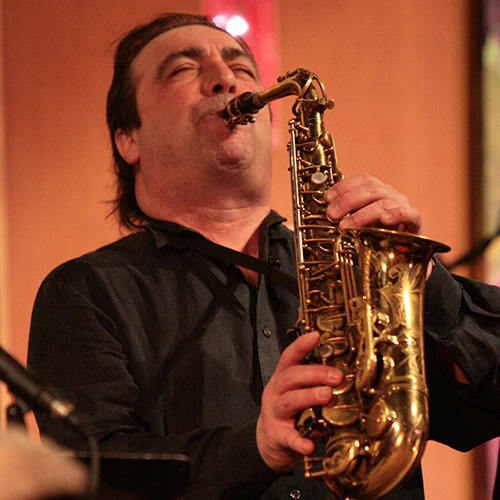 Saxophonist Greg Abate has been leading the charge of post-bop excellence around the state and remains a constant fixture in the area when he isn’t touring around the world. To coincide with the release of a new live album, Gratitude, he and I spoke on the phone about the new album, his music and his ever-evolving career.
Saxophonist Greg Abate has been leading the charge of post-bop excellence around the state and remains a constant fixture in the area when he isn’t touring around the world. To coincide with the release of a new live album, Gratitude, he and I spoke on the phone about the new album, his music and his ever-evolving career.
Ben Shaw: What was the organizing principle behind this new live album?
Greg Abate: I tried to keep it around a certain theme. I had written a tune, a samba, called “Gratitude,” so I was looking to do an album to go with my thoughts about being grateful for being able to write tunes, to keep doing this, etc. I brought back a couple of tunes that were on previous recordings like “The Stratosphere,” “Farewell Phil Woods” and “The Love Of Life,” and wrote some new tunes that were based on that feeling of gratitude.
The rehearsal was just a run-through of the melodies of these tunes about three weeks prior, where we just went top to bottom, no solos, over in about an hour. So when we got to the gig it was live, in-the-moment jazz, which is what I really like.
BS: You switch horns a lot on this record; does each one let you explore a different facet of your voice?
GA: Neil Weiss [of Whaling City Sound] had said, “Greg, you play all those horns well, so why not do them all on this record?” Originally I wanted to cut it down, but he convinced me otherwise. It’s a challenge, to play and record [Joe Henderson’s] “Inner Urge” on tenor, and the waltz and the samba lent themselves well to the flute. All the horns have their own voice and I have a voice on each of them, and I enjoy having that variable sound.
BS: How has the collaboration between you and Tim Ray evolved over your long-standing working relationship?
GA: It’s been four albums now. We had actually played a duo gig in the early ’80s at a monk monastery and have played many gigs since. I play with several pianists and bassists because nowadays everybody is busy and going all over the place, but Tim, John, Martin and I all hook up really well. Also, Neil liked the idea of the evolution of the band over a few recordings.
BS: How is modern music shaping the music you’re making?
GA: I like doing different things, I’m not too keen on avant-garde or fusion anymore, but I’m a post-bop player and consider myself a modern, flexible type of artist that has a voice in the tradition but isn’t a purist. I like to stretch out more, especially in live settings, to play Latin and Brazilian music as well, but the straight-ahead melodic playing is so infinite to me and keeps it all fresh.
BS: Does teaching provide with you with new perspectives, either on your own approach to the horn or in the music that you make?
GA: Yes it does, I learn a lot from them. Since they’re from a different generation, I can show them things and see the responses they give, and somehow find answers to my own questions through teaching and have learned a lot about my own playing as a result. It’s a bit harder than it was 10 years ago; I’m still trying to really push them and be concerned about getting it right. And it’s tiring, but it’s also a workout for my mind, which is great.
BS: As someone who has seen the jazz scene around Rhode Island evolve over many years, what sort of state do you feel like we’re in right now?
GA: There’s not many venues around, other than Chan’s, that do jazz. There’s not even a jazz club in Providence, which is a shame; most cities have at least one. The support is not there, and the people who have venues who might want jazz just don’t know what it is or don’t have a love or understanding of it. You have to love this stuff to want to present artful things. But when I’m traveling through the country, and through Europe, there are a lot of clubs and people will come out and want to hear this stuff, standards and original music.
BS: What new concepts have you been working on lately?
GA: I love playing harmony and changes the piano. On the horn, I’m trying to think chromatically and play things that aren’t habitual. Lately I’ve been writing etudes. I have a bunch of charts that are all hand-written, which is a good meditation first thing in the morning — two pages of free writing and then I’ll play them. I’m also inspired, but not doing a lot all the time, which keeps me excited by the gigs that I do and I can’t get bored with it.
For more information and links to music, visit gregabate.com. This interview has been lightly edited for clarity.
Ben Shaw is a local composer, performer, and writer. Find him at benjaminshawmusic.com.